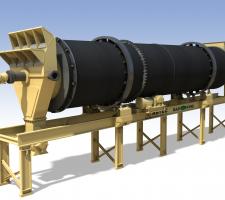RSSA leading asphalt plant manufacturer is claiming a RAP production first. Guy Woodford reports
With its rich history of innovation, US firm
Having introduced the
Astec president Malcolm Swanson said,“The RAP KING 100% RAP plant represents the culmination of efforts to offer producers a viable option for safely and efficiently producing a mix with only RAP.”
Meanwhile as RAP usage continues to increase as a way for producers to keep costs down while utilising stockpiles of reclaimed asphalt pavement, Astec has also increased the ability of its signature Double Barrel drum dryer/mixer to handle RAP. The Astec Double Barrel HR now includes enhancements to the drum which allows use of up to 65% RAP. A 1/8 model of the new high RAP Double Barrel drum was on display during ConExpo 2014.
“The Double Barrel HR is a key product in the Astec line. It fulfils a need for those producers who already run high percentages of RAP and in whose markets the trend toward running more recycle is expected to increase,” said Swanson.
The 120 MTPH Voyager plant is another recently unveiled by Astec. The Voyager 120 offers a compact, highly portable design. It is said to be the first plant in its class with the ability to run up to 30% RAP.
The Astec Voyager 120 is built around a counterflow drum featuring Astec v-flights. The v-flights provide greater uniformity of the aggregate veil during the drying process, which results in better heat transfer, a reduction of fuel use and increased productivity.
To enhance portability, a hydraulically driven swing out drag and batcher can be set and ready to go in about 10 minutes. Other features include a reverse pulse baghouse, a control cab with fully automated PLC controls, gravity take-up with direct drive, air ride suspension and up to five cold feed bins and two RAP bins.
Astec executive vice president Steve Claude said, “Astec is excited about the opportunities for the Voyager 120. Initial feedback from the industry has been extremely positive. Several orders for this plant have already been booked with the first production model set to ship immediately.”
Ciber’s cutting-edge asphalt plants
One Brazilian example is at Transcarioca in Rio de Janeiro during what was one of the main mobility works in the city ahead of the 2014 World Cup and 2016 Olympic Games. The avenue is being extended by 39km, cutting across Rio, connecting Barra da Tijuca to Ilha do Governador. Ciber’s UACF 17 P2 Advanced line plant is creating asphalt for the project’s paving teams based on a German technique called SMA (Stone Mix Asphalt), a special type of asphalt mix that results in a pavement with a much higher useful life and greater superficial roughness than those achieved through traditional techniques. This is said to result in a better cost/benefit relationship and higher safety for users.
Still in the Rio de Janeiro area, Ciber plants are also operating at Arco Metropolitano, a road that is being constructed in the area surrounding metropolitan Rio to provide an alternative route for the intense vehicle traffic crossing the city in order to reach other regional cities and towns. As part of the rigid road construction requirements there are key environmental protection guidelines. The filtering system of the one Ciber UACF 17 P1 and one UACF 15 P1 Advanced Line plants being deployed allows for pollution emissions significantly below local regulations. The new Arco Metropolitano route will connect Rio to the cities of Itaboraí, Guapimirim, Magé, Duque de Caxias, Nova Iguaçu, Japeri, Seropédica and Itaguaí.














